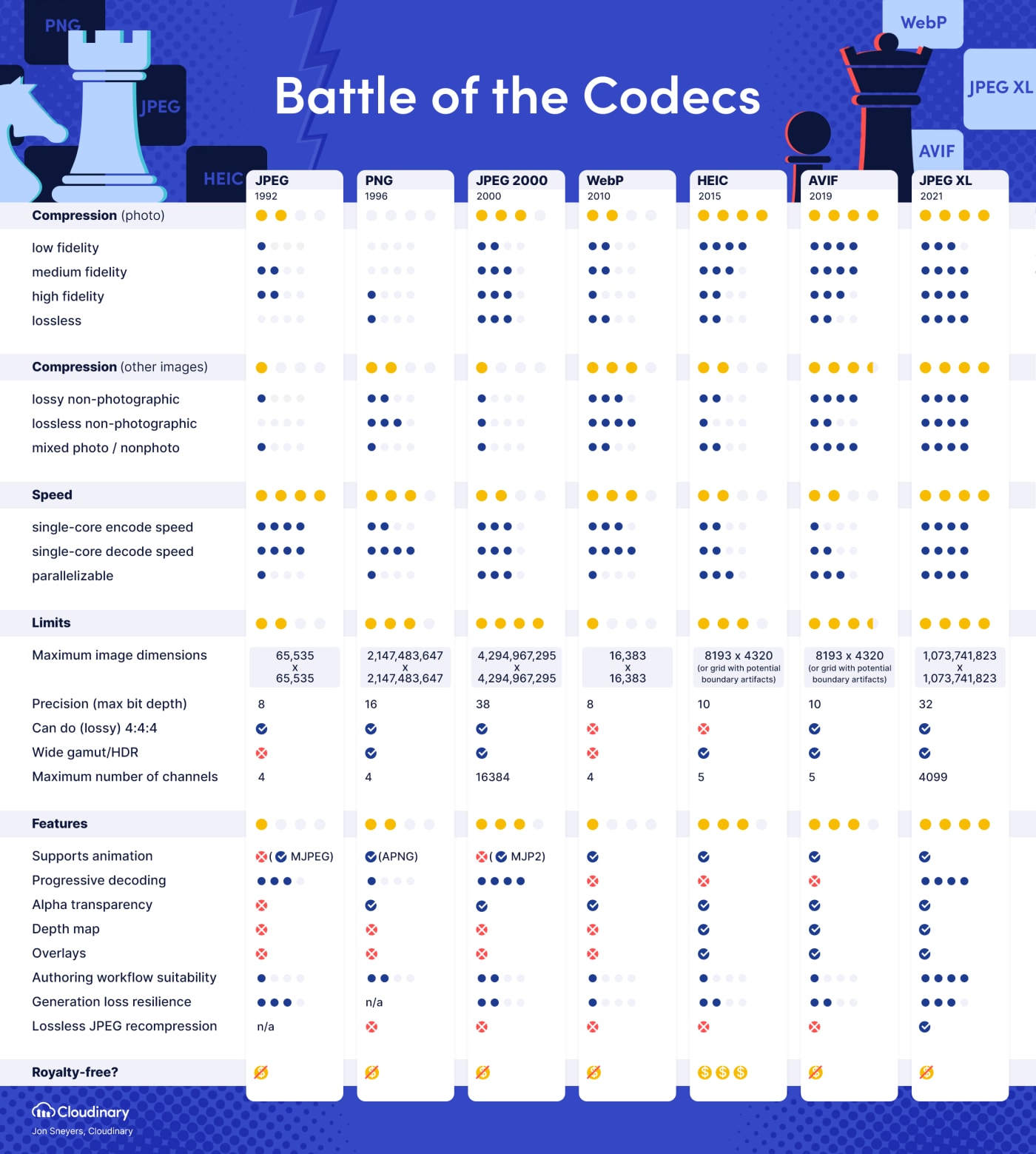if you could pick a standard format for a purpose what would it be and why?
e.g. flac for lossless audio because…
(yes you can add new categories)
summary:
- photos .jxl
- open domain image data .exr
- videos .av1
- lossless audio .flac
- lossy audio .opus
- subtitles srt/ass
- fonts .otf
- container mkv (doesnt contain .jxl)
- plain text utf-8 (many also say markup but disagree on the implementation)
- documents .odt
- archive files (this one is causing a bloodbath so i picked randomly) .tar.zst
- configuration files toml
- typesetting typst
- interchange format .ora
- models .gltf / .glb
- daw session files .dawproject
- otdr measurement results .xml
MKV It supports high-quality video and audio codecs, allowing for lossless compression and high-definition content. Also MKV supports chapter and menu functionality, making it suitable to rip DVD to MKV and store DVDs and Blu-ray discs.
I wish there was a more standardized open format for documents. And more people and software should use markdown/.md because you just don’t need anything fancier for most types of documents.
Some new format for DAW session files that is compatible with all DAWs. I believe ardour can import protools files but I bet a lot. Of work went into that.
Markdown for all rich text that doesn’t need super fancy shit like latex
which markdown implementation tho ?
You compile your markdown and don’t read it raw? /s
This is the kind of thing i think about all the time so i have a few.
- Archive files:
.tar.zst- Produces better compression ratios than the DEFLATE compression algorithm (used by
.zipandgzip/.gz) and does so faster. - By separating the jobs of archiving (
.tar), compressing (.zst), and (if you so choose) encrypting (.gpg),.tar.zstfollows the Unix philosophy of “Make each program do one thing well.”. .tar.xzis also very good and seems more popular (probably since it was released 6 years earlier in 2009), but, when tuned to it’s maximum compression level,.tar.zstcan achieve a compression ratio pretty close to LZMA (used by.tar.xzand.7z) and do it faster[1].zstd and xz trade blows in their compression ratio. Recompressing all packages to zstd with our options yields a total ~0.8% increase in package size on all of our packages combined, but the decompression time for all packages saw a ~1300% speedup.
- Produces better compression ratios than the DEFLATE compression algorithm (used by
- Image files:
JPEG XL/.jxl- “Why JPEG XL”
- Free and open format.
- Can handle lossy images, lossless images, images with transparency, images with layers, and animated images, giving it the potential of being a universal image format.
- Much better quality and compression efficiency than current lossy and lossless image formats (
.jpeg,.png,.gif). - Produces much smaller files for lossless images than AVIF[2]
- Supports much larger resolutions than AVIF’s 9-megapixel limit (important for lossless images).
- Supports up to 24-bit color depth, much more than AVIF’s 12-bit color depth limit (which, to be fair, is probably good enough).
- Videos (Codec):
AV1- Free and open format.
- Much more efficient than x264 (used by
.mp4) and VP9[3].
- Documents:
OpenDocument / ODF / .odt- @raubarno@lemmy.ml says it best here.
.odtis simply a better standard than.docx.
it’s already a NATO standard for documents Because the Microsoft Word ones (.doc, .docx) are unusable outside the Microsoft Office ecosystem. I feel outraged every time I need to edit .docx file because it breaks the layout easily. And some older .doc files cannot even work with Microsoft Word.
- @raubarno@lemmy.ml says it best here.
By separating the jobs of archiving (.tar), compressing (.zst), and (if you so choose) encrypting (.gpg), .tar.zst follows the Unix philosophy of “Make each program do one thing well.”.
The problem here being that GnuPG does nothing really well.
Videos (Codec): AV1
- Much more efficient than x264 (used by .mp4) and VP9[3].
AV1 is also much younger than H264 (AV1 is a specification, x264 is an implementation), and only recently have software-encoders become somewhat viable; a more apt comparison would have been AV1 to HEVC, though the latter is also somewhat old nowadays but still a competitive codec. Unfortunately currently there aren’t many options to use AV1 in a very meaningful way; you can encode your own media with it, but that’s about it; you can stream to YouTube, but YouTube will recode to another codec.
The problem here being that GnuPG does nothing really well.
Could you elaborate? I’ve never had any issues with gpg before and curious what people are having issues with.
Unfortunately currently there aren’t many options to use AV1 in a very meaningful way; you can encode your own media with it, but that’s about it; you can stream to YouTube, but YouTube will recode to another codec.
AV1 has almost full browser support (iirc) and companies like YouTube, Netflix, and Meta have started moving over to AV1 from VP9 (since AV1 is the successor to VP9). But you’re right, it’s still working on adoption, but this is moreso just my dreamworld than it is a prediction for future standardization.
Could you elaborate? I’ve never had any issues with gpg before and curious what people are having issues with.
This article and the blog post linked within it summarize it very well.
Encrypting Email
Don’t. Email is insecure . Even with PGP, it’s default-plaintext, which means that even if you do everything right, some totally reasonable person you mail, doing totally reasonable things, will invariably CC the quoted plaintext of your encrypted message to someone else
Okay, provide me with an open standard that is widely-used that provides similar functionality.
It isn’t there. There are parties who would like to move email users into their own little proprietary walled gardens, but not a replacement for email.
The guy is literally saying that encrypting email is unacceptable because it hasn’t been built from the ground up to support encryption.
I mean, the PGP guys added PGP to an existing system because otherwise nobody would use their nifty new system. Hell, it’s hard enough to get people to use PGP as it is. Saying “well, if everyone in the world just adopted a similar-but-new system that is more-amenable to encryption, that would be helpful”, sure, but people aren’t going to do that.
The message to be taken from here is rather “don’t bother”, if you need secure communication use something else, if you’re just using it so that Google can’t read your mail it might be ok but don’t expect this solution to be secure or anything. It’s security theater for the reasons listed, but the threat model for some people is a powerful adversary who can spend millions on software to find something against you in your communication and controls at least a significant portion of the infrastructure your data travels through. Think about whistleblowers in oppressive regimes, it’s absolutely crucial there that no information at all leaks. There’s just no way to safely rely on mail + PGP for secure communication there, and if you’re fine with your secrets leaking at one point or another, you didn’t really need that felt security in the first place. But then again, you’re just doing what the blog calls LARPing in the first place.
- Archive files:
Literally any file format except PDF for documents that need to be edited. Fuck Adobe and fuck Acrobat
Isn’t the point of PDF that it can’t (or, perhaps more accurately, shouldn’t) be edited after the fact? It’s supposed to be immutable.
I’m not sure if they were ever designed to be immutable, but that’s what a lot of people use it for because it’s harder to edit them. But there are programs that can edit PDFs. The main issue is I’m not aware of any free ones, and a lot of the alternatives don’t work as well as Adobe Acrobat which I hate! It’s always annoying at work when someone gets sent a document that they’re expected to edit and they don’t have an Acrobat license!
I’ve already edited some pdfs with LibreOffice writer. I don’t know if it’s suitable for that, but it worked for me
PDFs can contain a vast amount of different Image information, but often a good software that can edit vector data opens PDFs for editing easily. It might convert not embedded Fonts in paths and rasterize some transparency effects though. So Inkscape might work.
Ogg Opus for all lossy audio compression (mp3 needs to die)
7z or tar.zst for general purpose compression (zip and rar need to die)
How about tar.gz? How does gzip compare to zstd?
zip or 7z for compressed archives. I hate that for some reason rar has become the defacto standard for piracy. It’s just so bad.
The other day I saw a tar.gz containing a multipart-rar which contained an iso which contained a compressed bin file with an exe to decompress it. Soooo unnecessary.
Edit: And the decompressed game of course has all of its compressed assets in renamed zip files.
It was originally rar because it’s so easy to separate into multiple files. Now you can do that in other formats, but the legacy has stuck.
Not just that. RAR also has recovery records.
.tar.xz masterrace
This comment didn’t age well.
.tar.zstdall the way IMO. I’ve almost entirely switched to archiving with zstd, it’s a fantastic format.The only annoying thing is that the extension for zstd compression is zst (no d). Tar does not recognize a zstd extension, only zst is automatically recognized and decompressed. Come on!
JPEG-XL for rasterized images.
Never heard of that, thanks for bringing it to my attention!
How does it compare to AVIF?
AVIF is slower, has a way smaller maximum resolution and doesn’t support progressive decoding as well as lossless JPEG recompression.

matroska for media, we already have MKA for audio and MKV for video. An image container would be good too.
mp4 is more prone to data loss and slower to parse, while also being less flexible, despite this it seems to be a sort of pseudo standard.
(MP4, M4A, HEIF formats like heic, avif)
wait why not av4 or jpegxl
A mp4 file contains media in, for example, h264 and AAC codec, which is the combined for playback. It is not a codec itself.
OTDR measurement results in like XML or whatever open self documenting format, just not SOR. Or even just in actual standards compliant SOR, if that’s all I can get.
i dont understand any if the acrobyms
except XML xD
OTDR: Optical Time Domain Reflectometry
SOR: Standard OTDR Record
XML: Extensible Markup Language.sor files are a mess, poorly standardized, too restrictive as a format, and every manufacturer makes their own proprietary extensions.
what file extension, what category
Category: OTDR measurement results
File extension: .xml or something entirely newwhat on earth does rhat do
An OTDR sends pulses of laser light into a fiber optic cable and records the minute reflections that occur at every point of the cable over time. The time of arrival of the reflections corresponds to the position of where it was reflected. This way you can record the attenuation of an entire cable just from shining in pulses from one end. Good for checking if a new cable was properly installed, or for finding the location of issues in existing cables for debugging.













